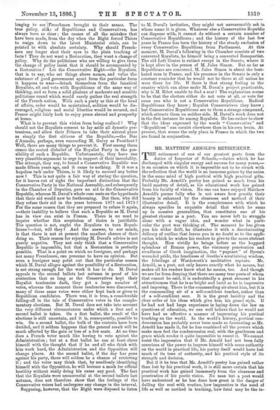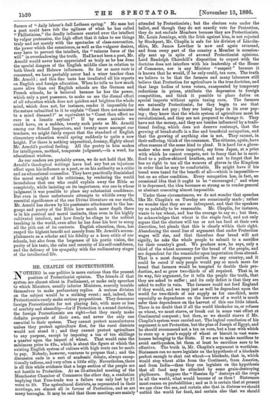MR. MATTHEW ARNOLD'S RETIREMENT.
THE retirement of one of our greatest poets from the duties of Inspector of Schools,—duties which he has discharged with singular energy and success for many years,— is an occasion on which it is impossible not to be struck with the reflection that the world is an immense gainer by the union in the same mind of high poetical with high practical gifts. Probably Mr. Arnold's poetry has gained as much from his lucid mastery of detail, as his educational work has gained from his faculty of vision. No one can have enjoyed Matthew Arnold's poems fully who is not aware how greatly their beauty is enhanced by the clearness and method of their
illustrative detail. It is the completeness with which he always specifies in exquisite detail that which he sums up in massive generalities, that constitutes one of his. greatest charms as a poet. You are never left to straggle alone with a vague idea, and wonder what in parti- cular the poet was thinking of. The moment he has given you his wider drift, he illustrates it with a discriminating delicacy of outline that leaves you in no doubt as to the appli- cation which he wishes his readers to give to the more abstract thought. How vividly he brings before us the haggard splendour of Roman power, the visionary penetration and steadiness of Greek imagination, the " pageant " of Byron's wounded pride, the loneliness of Goethe's scrutinising wisdom, the febrifuge of Wordsworth's meditative rapture. Mr. Arnold, as a poet, not only knows exactly what he means, but makes all his readers know what he means, too. And though we are far from denying that there are many true poets of whom that cannot be said, it is undoubtedly a great element in his attractiveness that he is as bright and lucid as he is impressive and imposing. There is the commanding air about him, but it is the commanding air of a self-confident teacher, rather than of a self-confident seer. It is the great lucidity and the clear order of his ideas which give him his grand style. If he had not had large experience in laying down the law on questions of education, we can well believe that he would not have had so effective a manner of impressing his poetical teaching on the world. In the world's history, poetical con- descension has probably never been made so fascinating as Mr. Arnold has made it, for he has combined all the powers which make men feel the condescension real, with the gentleness and grace which render it quite impossible to resent it. We cannot resist the impression that if Mr. Arnold had not been fully conscious of the power to impress himself with some authority on the world in practical life, his poetry itself would have lost much of its tone of authority, and his poetical style of its strength and decision.
But if it be true that Mr. Arnold's poetry has gained rather than lost by his practical work, it is still more certain that his practical work has gained immensely from the clearness and penetration of his poetic vision. No man but a poet would have understood as he has done how great is the danger of dulling the soul with routine, how imperative is the need of life as well as method in teaching, how fatal may be the in.
fluence of "daily labour's dull Lethean spring." No man but a poet could have felt the ugliness of what he has called "Philistinism," the deadly influence exerted over the intellect by vulgar pretension, the high effort that it takes to see things truly and not merely with the spectacles of class-convention, the power which the conscience, as well as the vulgarer desires, may have to pervert the intellect, the "ruinous force of the will" in overshadowing the truth. Had he not been a poet, Mr.
Arnold would never have appreciated as truly as he has done the special dangers of the English middle class in relation to both Greek and Hebrew influences. So far as mere taste is concerned, we have probably never had a wiser teacher than Mr. Arnold ; and this fine taste has irradiated all his reports on English and foreign education. When he tells us how much more alive than our English schools are the German and French schools, he is believed because he has the power, which only a poet possesses, to make us see the dismal effect of all education which does not quicken and brighten the whole mind, which does not, for instance, render it impossible for the nature submitted to it to explain "Gang thou not minister to a mind diseased ?" as equivalent to " Canst thou effect no cure in a lunatic asylum I" If by some miracle we could have, on a sudden, twenty such poets as Mr. Arnold among our School Inspectors, and twenty more amongst our teachers, we might fairly expect that the standard of English elementary education would spring suddenly to quite a new height. For there is nothing unpractical, dreamy, flighty about Mr. Arnold's poetical feeling. All the poetry in him makes for intelligence, method, temperate judgment,—in a word, for educational wisdom.
As our readers are probably aware, we do not hold that Mr. Arnold's theological writings have had any but an injurious effect upon his influence as a poet, or on his authority as a critic and an educational counsellor. They have practically diminished the moral weight of his criticisms, by rendering the world incredulous that one who could explain away the Bible so completely, while insisting on its importance, was one in whose judgment it was possible to place any substantial confidence. But even in these unfortunate attempts to whittle away the essential significance of the one Divine literature on our earth, Mr. Arnold has shown by his passionate attachment to the lan- guage and poetry of the Bible how much more depth there is in his poetical and moral instincts, than even in his highly cultivated intellect, and how firmly he clings to the noblest teaching in the world, even after he has done his best to scoop all the pith out of its contents. English education, then, has reaped the highest benefit not merely from Mr. Arnold's accom- plishments as a scholar and his fidelity as a keen critic of our schools, but also from the largeness of his poetic vision, the purity of his taste, the calm and serenity of his self-confidence, and the delicacy of his sympathy with the rudimentary stages of the intellectual life.



































 Previous page
Previous page